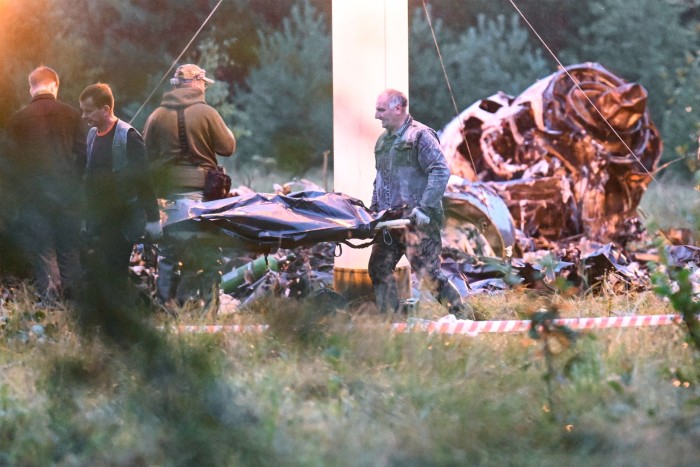Wagner fighters made a makeshift memorial for their founder Yevgeny Prigozhin in St Petersburg on Thursday as the Kremlin maintained its silence on the warlord’s apparent demise in a plane crash.
Supporters of Prigozhin, who is listed among the passengers of a private jet that crashed north-west of Moscow on Wednesday, killing all aboard, mourned the warlord’s loss and accused “traitors” of assassinating him in retribution for a mutiny he led in late June.
Investigators launched a criminal investigation into the crash on Thursday and the aviation agency said it was searching for the plane’s black box. But the Kremlin has so far made no comment on the fate of Prigozhin, who two months ago led an uprising against Vladimir Putin’s regime.
Graphic footage from the site of the crash showed the plane’s burning carcass. Several bodies have been retrieved, authorities have said, but none has been officially identified as Prigozhin.
Prigozhin and his group are accused of numerous brutal war crimes in Ukraine and also in parts of the Middle East and Africa where they have operated, but the warlord was popular with some in Russia for his battlefield successes in Ukraine and his straight-talking critique of the army leadership.
The St Petersburg headquarters of the Wagner militia lit up in the shape of a cross overnight and some masked fighters wearing camouflage knelt in tears in front of pictures of the warlord.
“It was a huge honour to have known and worked with Number One. The country has lost its hero and best conductor,” a Wagner-affiliated channel wrote on Telegram. Another said Prigozhin would be “the best, even in hell” and shared a clip of the classical composer Richard Wagner’s Ride of the Valkyries.
Many in the hardline group shared Prigozhin’s view that Russia could have been more successful in its invasion of Ukraine had it not been for blunders committed by the country’s top generals. Several popular channels with hundreds of thousands of subscribers argued that Prigozhin had been assassinated in retribution and shared purported proof that the plane had been shot down by an anti-aircraft missile system.

The apparent move to decapitate Wagner signalled Putin’s intention to shore up the position of Russia’s armed forces and the return to favour of uniformed generals over the mercenary group’s leaders and officials close to them, western officials told the Financial Times on Thursday.
While cautioning that details of the operation and its fallout were still unclear, the officials privately suggested that it would severely weaken Wagner’s influence inside Russia, but not significantly affect its activities in foreign countries where it remained an important aspect of Kremlin power.
Tighter Kremlin control over the group could also allow Putin to bring its non-military operations, such as lucrative natural resource supply contracts in African countries, closer to the state budget, one of the officials added.
“It shows Putin’s focus on revenge,” said one of the officials.
Putin, who was speaking at a second world war memorial event in Kursk on Wednesday when news of the plane crash broke, has remained silent on the incident so far.
US president Joe Biden told reporters on Wednesday he did not “know for a fact what happened” but was “not surprised”.
Many expected some retribution for Prigozhin’s mutiny attempt in June and doubted that the deal the warlord struck with the Kremlin — which would have seen Wagner and its leader relocate quietly to Belarus — would be the end of the story.
“Yevgeny Prigozhin was a nuisance to too many people. The number of enemies reached a critical point,” Sergei Mironov, the outspoken, pro-war leader of a Kremlin-controlled opposition party, wrote on X, formerly Twitter.
“In Prigozhin’s case, it was specific scum who planned his death,” he added. It was not clear who he was accusing.
A few flowers were also seen laid near Wagner recruitment centres in other parts of Russia, including in Yekaterinburg in the Urals and Novosibirsk.
Prigozhin’s private jet, an Embraer Legacy that he had recently used to travel between Moscow, Belarus, his hometown of St Petersburg, and to parts of Africa where Wagner operates, crashed at midday on Wednesday in the Tver region north-west of Moscow, near the village of Kuzhenkino.
Prigozhin was killed by “traitors of Russia”, one Wagner-linked channel wrote.
“The assassination of Prigozhin will have disastrous consequences. The people who gave the order do not understand the mood in the army and morale at all,” said Roman Saponkov, a Russian war-blogger and invasion cheerleader who is also considered close to the Wagner group.

Another anonymous Telegram channel, known to be run by a former Wagner staffer, also mourned the death of extremist Dmitri Utkin, a founder of the Wagner militia who appears to have died in the crash with Prigozhin.
“Alas, betrayal . . . led Dmitri Utkin to his grave,” the authors wrote. “The legendary fighter and commander died not on the battlefield, but from a cowardly blow in the back.”
Russian officials said all 10 people aboard the plane had been killed, and Russia’s aviation agency later listed their names, including Prigozhin, Utkin, and other less well-known Wagner figures, as well as three crew members.
Video of the crash and its aftermath posted by social media channels with ties to Russian security services showed the plane rapidly descending from the sky, accompanied by a plume resembling shots fired from anti-aircraft defences, before crashing to the ground in a ball of flames.
The St Petersburg outlet Fontanka, which has reported extensively on the warlord in the past, cited a source at the scene of the crash on Thursday as saying that “the bodies of the dead, including the possible body of Yevgeny Prigozhin, are not visually identifiable because they were badly damaged after the crash”.
The RIA state news agency reported that the plane’s tail was found 3.5 kilometres from the crash site.
